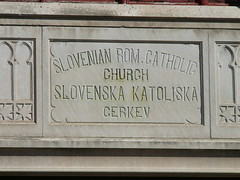A big buzz concept in globalization studies is the idea that the labor migrations associated with contemporary globalization have created "transnational communities" and identities. Migrants don't give up their home identities, but keep up contacts with the home country through telephone, email, tapes, what have you. And of course, they send back money. The exchange of emotional and material capital between home and away changes home too. Both ends of the migration are transformed into a new, transnational community.
Last week on our way back from a conference in Madison we got off the interstate in LaSalle, Illinois, where I took this photo of the Slovenian Catholic Church--vintage early 20th century. I've seen plenty of church facades like this one in Chicago. But it was remarkable to see this and about 10 other churches--mostly Catholic--in this small coal mining town on the Illinois River. It is a marker of how the global migration of the 19th and early 20th century reached even into the small town midwest. My friend Caroline Merithew wrote her dissertation on these towns and their immigrant communities. Where's the book, Caroline!
Global | Local | Middle
Sunday, October 08, 2006
Subscribe to:
Post Comments (Atom)


1 comment:
I too love seeing this stuff. As you noted, iving in Chicago, of course, remnants of these transnational communities are everywhere. But thanks to those corporate "jobbers" in the late nineteenth century, we have towns and artifacts like this all over "rural" America. Capitalism giveth, and Capitalism taketh away!
If people really understood how much their towns and cities relied on the sweat and labor of "foreigners," would there be so much consternation over Mexican immigration? Is this a failure on the part of immigration historians to really insinuate themselves in primary and second school history curriculums?
I wonder how active preservation organizations are in these small towns. Do they know what they have? - TL
Post a Comment